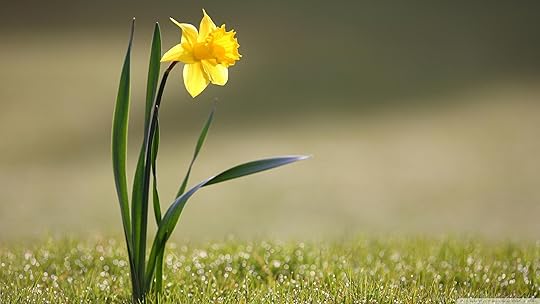Richard Harris's Blog, page 14
October 28, 2017
Quote of the Day
“Heaven opened and the water hammered down, reviving the reluctant old well, greenmossing the pigless pigsty, carpet bombing still, tea-colored puddles the way memory bombs still, tea-colored minds.”
― Arundhati Roy, The God of Small Things
It’s raining out today. Therefore, I am thinking about rain. Actually, this sentence jumped out at me, and I very much enjoyed the Booker Prize-winning novel The God of Small Things, so what the heck! I figure anytime you have to double-take a single sentence a couple of times because it’s so full of vivid imagery, you’ve got a winner on your hands.
In case you haven’t heard, Ms. Roy has a (relatively) new novel out, The Ministry of Utmost Happiness, which, according to the book’s blurb, “takes us on an intimate journey of many years across the Indian subcontinent – from the cramped neighborhoods of Old Delhi and the roads of the new city to the mountains and valleys of Kashmir and beyond, where war is peace and peace is war.”


October 27, 2017
Quote of the Day

“… “That at a certain point in our lives, we lose control of what´s happening to us, and our lives become controlled by fate. That´s the world´s greatest lie.”
– The Alchemist, Paulo Cohelo
Indeed, Willy S. would agree with Mr. Coelho: “It is not in the stars to hold our destiny but in ourselves.”
And like Bill the Bard, I have a mixed relationship with Paulo Coelho; with the former he confuses the freckles out of me (my shortfall as a reader, my dearth of freckles a slight problem), but with the latter he’s too preachy most of the time.
That being said, what Coelho does excel at – and by virtue his translator as well – is writing witty, memorable lines/passages. The above quote is but one shining example. And, to be fair, The Alchemist was for me an enjoyable read in much the same way The Little Prince was a good read and, to a lesser extent, The 100-Year-Old Man Who Climbed Out the Window and Disappeared.
Finally, I have to admit that one of my favourite Coelho quotes is also the perfect ending to the Quote of the Day and comes from the same book:
“And, when you want something, all the universe conspires in helping you to achieve it.”


Hope
I had a good day yesterday.
I’m like most people. Some days are good, some days are bad, and some days it rains (thank you, Bull Durham). On good days, I think a lot about the word “hope,” and that in turn gets me to thinking about languages and how we express ourselves.
Usually when I want to explore the meaning of a word, I compare the English with the Korean, which often leads to comparing it to the Chinese (roughly 70 percent of Korean words are derived from Chinese characters).
I do this because I’m often fascinated/surprised at the differences we have in our respective etymologies. But that’s the whole point: Language is not uniform around the world and reflects past cultures, histories and beliefs.
What’s interesting about “hope” is that it’s actually one of those rare cases of being – as they say in Korea – “Same-same but different.”
Take a look first at the English roots of the word:
Old English hopian “wish, expect, look forward (to something),” of unknown origin, a general North Sea Germanic word (cf. Old Frisian hopia, Middle Low German, Middle Dutch, Dutch hopen ; Middle High German hoffen “to hope,” borrowed from Low German). Some suggest a connection with hop (v.) on the notion of “leaping in expectation” [Klein].
The word “hope” in Korean is heemang (희망), NOT gidae (기대) as Google Translate would have you believe, and comes from the Chinese xīwàng (希望), xī meaning “hope, rare, scarce” and wàng meaning “ambition, full moon, hope, desire, aspire to, expect.”
I suppose you could get creative and say that “hope” to the Chinese and Koreans is like the scarcity of a full moon (i.e. it only happens once every 29.53 days), but in reality they look at it the same way we English speakers do: there is a leap in expectation, an ambition for the rare, or – as the idiom goes in English in extreme cases – to hope against hope.
Then again, maybe languages bore you and you like to cling to the mythological instead, Pandora’s box and all.
Whatever the case, here’s to the hope of another good day, another one of those rare full moons which for those of us in the EST will be on November 4 at 1:24 a.m. EST, making it, according to The Old Farmer’s Almanac, a Full Beaver Moon.


The Original Italian (Poet) Stallion
This lonely hill has always
Been dear to me, and this thicket
Which shuts out most of the final
Horizon from view. I sit here,
And gaze, and imagine
The interminable spaces
That stretch away, beyond my mind,
Their uncanny silences, Their profound calms;
It was always dear to me, this solitary hill,
and this hedgerow here, that closes off my view,
from so much of the ultimate horizon.
But sitting here, and watching here,
in thought, I create interminable spaces,
greater than human silences, and deepest
quiet, where the heart barely fails to terrify.
This solitary hill has always been dear to me
And this hedge, which prevents me from seeing most of
The endless horizon.
But when I sit and gaze, I imagine, in my thoughts
Endless spaces beyond the hedge,
An all encompassing silence and a deeply profound quiet,
To the point that my heart is almost overwhelmed.
I’ve always loved this hermit’s hill,
the hedgerow here that mostly hides the view
of where, far off, earth meets the sky.
But sitting, gazing, I can dream
unbounded spaces past that line
and suprahuman silences,
a final depth of quietness,
where for a little while the heart
is not afraid.
Giacomo Leopardi, “L’infinito”
So if you read my last post, “Beware: Artistry Kills,” you’ll be familiar with the name Giacomo Leopardi (1798-1837) now. He’s the smooth-talking operator who wrote himself into the grave through his poetry.
I was curious, though, was his stuff any good? Although I feel more comfortable being Judgy McJudge when it comes to fiction and non-fiction, I always go with my gut when reading poetry. And my sense with this poem is that it’s got a voice and a viewpoint, two critical things every decent artist requires.


October 26, 2017
Beware: Artistry Kills
As Fantine sings so gloriously in Les Miserables upon being left alone, jobless, and utterly destitute:
There was a time when men were kind
When their voices were soft
And their words inviting
There was a time when love was blind
And the world was a song
And the song was exciting
There was a time…
Then it all went wrong
Indeed, sometimes it goes horribly wrong, especially for artists who pretty much throw their souls into their work with (apparently) no interest in whether they pop up the better side of Mt. BreakMyHeart.
Emily Temple has put together a little list of authors that all you HSP writers out there should heed. In a piece titled “6 Famous Writers Injured While Writing: When Making Stuff is Hazardous to Your Health,” Ms. Temple gets straight to the point with these tragic stories about six famous writers, most of whom you know and probably respect.
Here’s the brief version of who you’ll see on this all-star ballot.
If you could even begin to imagine the pain George Orwell was in as he penned the final pages of Nineteen Eighty-Four, you’d go back and read it with a lot more sympathy (not the anger that your high school English teacher aroused in you for making you read it). I don’t like using the word “literally” literally, but Orwell literally spent the last two months of his life bed-ridden with tuberculosis, coughing up blood and figuring out how to bring an end to Big Brother.
If you know anything about Moby-Dick the book, then you already know a lot about Herman Melville. If not, read Nathaniel Philbrick’s excellent book I n the Heart of the Sea: The Tragedy of the Whaleship Essex to see the definition of bad luck played out in slow motion. Sunk at sea? Check. Survivor of the longest rescue mission in maritime history? Yep. Forced to resort to cannibalism. See previous said book. Sunk at sea a second time while captaining a ship? Hells yeah, only to return to Nantucket and basically kill himself writing Moby-Dick.
You might not know the Italian poet Giacomo Leopardi, but to reference Dr. Andrea Dinardo from yesterday’s post, the guy had a serious case of the HSP. I mean, here was a dude who lived to write – and only write, it seemed – describing himself thusly as a result of his literary predilections: “I have woefully and incurably ruined myself for the rest of my life, rendering my appearance terrible and despicable to most people.” He’d write himself dead before his 40th birthday.
Are you reading this whilst enjoying a cup of morning Joe? Do you presently find yourself at a coffee shop? Then obviously Honoré de Balzac is your man. Here’s a guy who loved coffee so much, and grew so addicted to it, that by the end of the show he was eating coffee beans on an empty stomach to maximize the uptake of its caffeine. No surprise that by the age of 51, Balzac was dead of – you guessed it! – caffeine poisoning.
Oh, Ayn Rand, where art thou? Rand’s dependence on Benzedrine (amphetamines) grew so severe during the writing of The Fountainhead that she was basically an eight-car pile-up of a trainwreck by the end of it, with one biographer stating that “by the time the book was complete Rand’s doctor diagnosed her as close to a nervous breakdown and ordered her to take two weeks of complete rest.”
Okay, here’s a look at the daily schedule of one Franz Kafka: 8:30 am-2:30 pm (job); 2:30-7:30 pm (lunch and sleep); 7:30-11 pm (exercises, family dinner); 11 pm-1/2/3…6 am (write like a MoFo); repeat until death. As Ms. Temple writes: “This weakened state may or may not have played a role in his contraction of laryngeal tuberculosis and its subsequent ravages on his body, so it’s too much to say his work killed him, but it certainly seems relevant. His throat closed up, precluding the ingestion of any food, and so he technically died of starvation, working on his story “The Hunger Artist” to the very last.” WTF?
So there you have it. If you have plans to become a writer, get some kind of insurance policy in case you starve to death, end up on a diet of coffee beans, or need to relocate to your bedroom because you can’t stop coughing up blood.
All I have to say is this: Where have all the great writers gone! Notice that Hemingway didn’t even make that list. Man up, Papa!


October 25, 2017
Quote of the Day
“Fashion has two purposes: comfort and love. Beauty comes when fashion succeeds.” ― Coco Chanel
Ostensibly this is a site about books and literature and other blah blah blah interesting things. But every once in a while, I’ve got to just run with the ball, all the way out of the stadium like an F. Gump on ‘roids, and somehow make it work.
Earlier, while searching my Vic 20’s extensive catalogue of memorable things that even more memorable people have uttered over the ages, I stumbled upon fashion (always my secret weapon), and was amazed to learn that pretty much every quote was not only on the mark, but eloquently stated (irony/destiny?).
So without further ado, here are some old and new classics on the subject…
Never use the word ‘cheap’. Today everybody can look chic in inexpensive clothes (the rich buy them too). There is good clothing design on every level today. You can be the chicest thing in the world in a T-shirt and jeans — it’s up to you.”
― Karl Lagerfeld
“Every generation laughs at the old fashions, but follows religiously the new.”
― Henry David Thoreau
“He’s always asking: ‘Is that new? I haven’t seen that before.’ It’s like, Why don’t you mind your own business? Solve world hunger. Get out of my closet.”
― Michelle Obama
“The most beautiful makeup of a woman is passion. But cosmetics are easier to buy.”
― Yves Saint-Laurent
“[how can anyone] be silly enough to think himself better than other people, because his clothes are made of finer woolen thread than theirs. After all, those fine clothes were once worn by a sheep, and they never turned it into anything better than a sheep.”
― Thomas More, Utopia
“A girl’s got to use what she’s given and I’m not going to make a guy drool the way a Britney video does. So I take it to extremes. I don’t say I dress sexily on stage – what I do is so extreme. It’s meant to make guys think: ‘I don’t know if this is sexy or just weird.”
― Lady Gaga
“There is one other reason for dressing well, namely that dogs respect it, and will not attack you in good clothes.”
― Ralph Waldo Emerson
“Speed eliminates all doubt. Am I smart enough? Will people like me? Do I really look all right in this plastic jumpsuit?”
― David Sedaris
“You can never be overdressed or overeducated.”
― Oscar Wilde


Are You an HSP?
Those in the know will know I’m not referring to Hispanics, but in fact a highly sensitive person. Like a lot of things we’re still learning about inside that tricky brain of ours, there has been a lot of misunderstanding about this subject over the years. But there’s now a doctor in the house!
In her post titled, funny enough, “Are you a highly sensitive person (HSP)?“, psychology professor Dr. Andrea Dinardo explains that HSP is not a choice; it’s biological (she’s got cool pictures to back this up, too). As she puts it:
“Brain scans show that HSP’s have ‘heightened activity in empathy-related brain regions‘ including the anterior insula (insular cortex), highlighted in the brain scan below.
[image error]
Definitely take time to visit Dr. Dinardo’s site, but if you’re curious whether you’re not just uber sensitive/hysterical/overly emotional, and actually HSP, check out the following self test:
Are you easily overwhelmed by such things as bright lights, strong smells, coarse fabrics, or sirens nearby?
Do you get rattled when you have a lot to do in a short amount of time?
Do you make a point of avoiding violent movies and TV shows?
Do you need to withdraw during busy days, into bed or a darkened room or some other place where you can have privacy and relief from the situation?
Do you make it a high priority to arrange your life to avoid upsetting or overwhelming situations?
Do you notice or enjoy delicate or fine scents, tastes, sounds, or works of art?
Do you have a rich and complex inner life?
When you were a child, did your parents or teachers see you as sensitive or shy?


The Price of Happiness? About $1.8 million
This is one of those stories about happiness you don’t hear every day. Mostly because it stems from the mind – and hand – of one Albert Einstein.
Rachel Siegel over at The Washington Post penned an article called “Einstein scribbled his theory of happiness in place of a tip. It just sold for more than $1 million,” and sums up the unlikely story of how a tip morphed into millions, and how one of history’s most influential scientists and thinkers imparted some advice we’d all like to know: the theory not of relativity but of happiness. Per the article:
“In November 1922, Einstein was traveling from Europe to Japan for a lecture series…News of Einstein’s arrival spread quickly through Japan, and thousands of people flocked to catch a glimpse of the Nobel laureate. Impressed but also embarrassed by the publicity, Einstein tried to write down his thoughts and feelings from his secluded room at the Imperial Hotel in Tokyo.
That’s when the messenger arrived with a delivery. He either “refused to accept a tip, in line with local practice, or Einstein had no small change available,” according to the AFP.
Instead, Einstein wrote two short notes and handed them to the messenger. If you are lucky, the notes themselves will someday be worth more than some spare change, Einstein said, according to the seller of the letters, a resident of Hamburg, Germany who is reported to be a relative of the messenger.
Those autographed notes, in which Einstein offered his thoughts on how to live a happy and fulfilling life, sold at a Jerusalem auction house Tuesday…”
What was the advice and how much were these thoughts worth in today’s currency?
1. “A calm and modest life brings more happiness than the pursuit of success combined with constant restlessness.” ($1.56 million)
2. “When there’s a will, there’s a way.” ($240,000)
And to think, today with the Internet at our fingertips that advice is free!


October 24, 2017
Quote of the Day
“How silly then to imagine that the human mind, which is formed of the same elements as divine beings, objects to movement and change of abode, while the divine nature finds delight and even self-preservation in continual and very rapid change.”
— Seneca
No, Seneca. You were wrong. Moving sucks. Like, sucks the big one. Hardcore.
Sorry, but after yet another move today (so, so, so glad I keep so many freaking books), my muscles in need of some East German speed skater hands to massage over them, I vehemently and diametrically oppose the notion that it’s “silly” to object to changing abodes.
Seriously, look at that Polaroid above! That was taken back when the dude was tutoring Nero on how to fiddle with the best of ’em when your city/empire is burning to the ground. Does that look like a guy who’s happy to move? No, it does not. That’s the look that says Thank you very much, but I would prefer to live in my present godforsaken hellhole than to move into a sweeter, phatter pad by the Coliseum.


New Crack on the Block
Like we need more crack for computer users.
Nir Eyal has an interesting post out today called “The Billion Dollar Mind Trick: An Intro to Triggers.” Watch out you fans of Instagram. Red flags all around.
“We check Twitter when we feel boredom. We pull up Facebook when we’re lonesome. The impulse to use these services is cued by emotions. But how does an app like Instagram create internal triggers in…millions of other users? Turns out there is a stepwise approach to create internal triggers:”
Uh-oh. “Stepwise” sounds well thought out. “Approach” seems savvy and business-like. And here’s the secret formula that Colonel Sanders and the Rice Krispies crew have been concocting while you snap, chat and post:
1 — EDUCATE AND ACQUIRE WITH EXTERNAL TRIGGERS
2— CREATE DESIRE
3 — AFFIX THE INTERNAL TRIGGERS
Yep. Those guys took a page right out of the “Welcome to My Neighbourhood: Let Me Introduce You to My Friends Mary Jane, China White & Charlie” playbook.
I’m not sure how many more apps and online services we need to fully destroy our brains and take away from free time that could otherwise be used to do more wholesome things like bake bread or play darts.
All I know is that Jonathan Franzen was onto something when he bemoaned young writers trying to make a go of it in this day and age, saying that he feels sorry for the lot of us because how on earth are we supposed to write creatively when we’re supposed (i.e. expected) to be online most of the time and building our brand.
Oh, Mr. Franzen, if you only knew…














